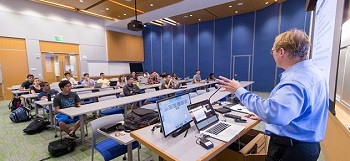A new working group will evaluate Vanderbilt’s digital project resources and services and make recommendations aimed at supporting the university’s current and future needs, Provost and Vice Chancellor for Academic Affairs Susan R. Wente announced Aug. 5.
Digital services and project support enable the creation of a range of tools and products that include online content and videos, digital collections and archives, dashboards, research gateways, data visualizations and more.
Douglas C. Schmidt, associate provost for research development and technologies and Cornelius Vanderbilt Professor of Engineering (Computer Science), will lead the working group. Gautam Biswas, Cornelius Vanderbilt Professor of Engineering, professor of computer science and computer engineering, is also part of the group.
Its charge is evaluating current digital services and available project support, assessing future needs and developing a report with recommendations on the best path forward. The working group plans to issue a report to the provost by the end of March 2020.

“We plan to coordinate our efforts and share any findings that can help the university more fully support our outstanding faculty and students,” Schmidt said. “One of our goals is to develop a sustainable model for digital services that benefits current and future research and education across disciplines.”
As the group develops its comprehensive set of recommendations, it will seek input from multiple stakeholders, including students and staff. “There might be opportunities for students to benefit by providing technological assistance on faculty research, as one example,” Schmidt said. “We also want to empower the staff by being able to link together different educational technology groups.”
A number of university units provide support for digital services and projects across campus, including the Jean and Alexander Heard Libraries Digital Scholarship and Communications Office, Center for Teaching, Advanced Computing Center for Research and Education, Center for Digital Humanities, Data Science Institute and Research IT Service.
“With cutting-edge discovery and learning happening in all corners of campus, every school, department and discipline has a need for a range of digital technologies,” Wente said. “We have made progress over the past few years in expanding digital literacy and making needed investments. We need to go a step further and take stock of any gaps and identify opportunities to enhance and coordinate our resources. At the end of the day, we want to enable our faculty, staff and students to pursue their work with the latest tools and methods.”

The group’s 14 members are drawn from across Vanderbilt, including the schools of engineering, nursing, education, music, law, divinity and the College of Arts and Sciences. Four members, Biswas among them, also are part of the Computational Thinking and Learning Initiative, one of the 2019 Trans-Institutional Programs (TIPs) award recipients. Computational thinking and learning is an approach that frames problems and develops solutions with computer/digital methods and relies heavily on a variety of digital tools and resources.
The Digital Projects and Services Working Group will propose a model for coordinating and aligning resources across these groups and recommend what additional or new services might be folded into the Computational Thinking and Learning Initiative. Participants in this TIPs initiative will engage with the group in a strategic planning process.
Schmidt is also serving on the Online Education Committee to ensure coordination since online courses and programs rely heavily on digital tools to produce course content.